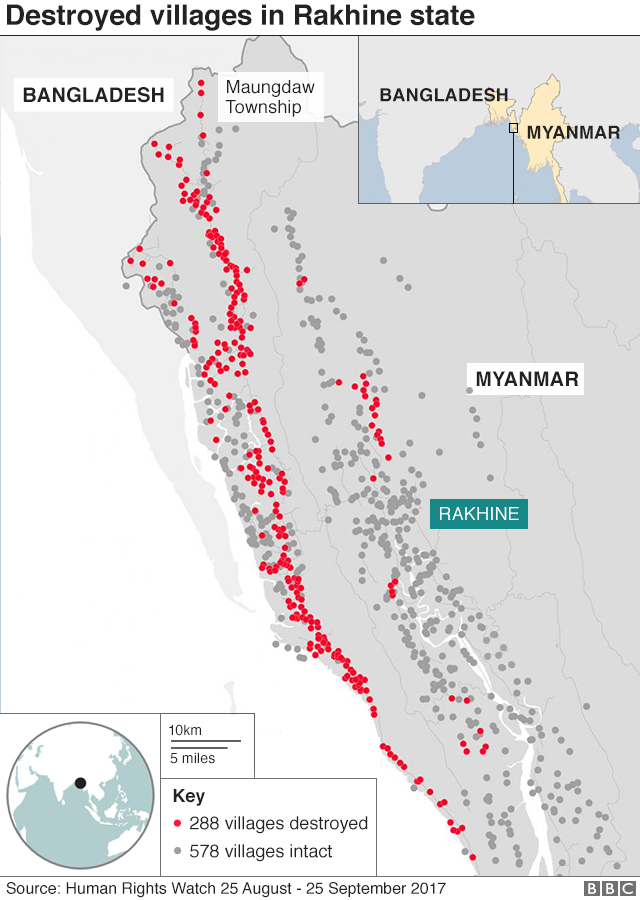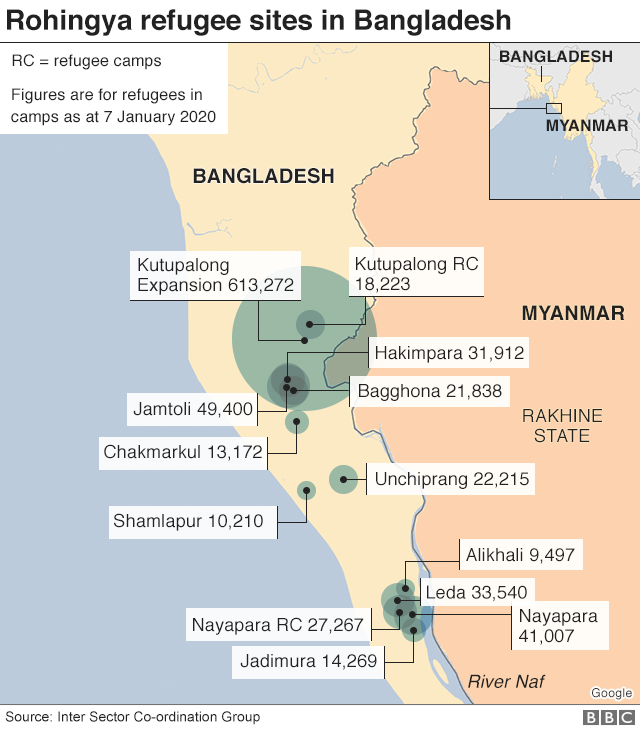Table of Contents
Introduction
The Rohingya are a majority-Muslim ethnic group who have lived in the Buddhist nation of Myanmar for centuries.
UN Secretary-General Antonio Guterres described them as “one of, if not the, most discriminated people in the world”.
The Rohingya people have faced decades of systematic discrimination, statelessness and targeted violence in Rakhine State, Myanmar.
Effectively denied citizenship under the 1982 Citizenship Law in Myanmar, they are one of the largest stateless populations in the world.
There are an estimated 3.5 million Rohingya dispersed worldwide.
Before August 2017, the majority of the estimated one million Rohingya in Myanmar resided in Rakhine State, where they accounted for nearly a third of the population.
They differ from Myanmar’s dominant Buddhist groups ethnically, linguistically, and religiously.
Discriminatory policies of Myanmar’s predominantly Buddhist government since the late 1970s have compelled hundreds of thousands of Muslim Rohingya to flee their homes in the predominantly Buddhist country.
Most have crossed by land into Bangladesh, while others have taken to the sea to reach Indonesia, Malaysia, and Thailand.
Since late August 2017, more than 671,000 Rohingya Muslims have fled Burma’s Rakhine State to escape the military’s large-scale campaign of ethnic cleansing.

History of Rohingya Crisis
Medieval Muslim Rakhine Kingdom
The Rohingya trace their origins in the region to the fifteenth century, when thousands of Muslims came to the former Arakan Kingdom.
In 1430 AD, Rakhine kingdom was founded, with its capital in Mrauk U.
Situated on the border between Buddhist and Muslim Asia, the city became one of Asia’s richest. In 1785 it came under Burmese control.
British Rule (1824-1948)
During the British rule , Muslim community in Rakhine expanded rapidly doubling from the 1880s to 1930s.
Expanding rice cultivation required significant labor, largely filled by Muslim workers from neighboring Bengal.
During World War II, Rakhine State was on the front line between the Japanese troops and allied forces. Muslims were mostly pro-British, while Rakhine Buddhists initially supported the Japanese.
Rohingya under Myanmar
After Myanmar’s independence from British rule in 1948, a Muslim rebellion erupted in Rakhine, demanding equal rights and an autonomous area, which was eventually defeated.
With the Military rule in 1962, rights of Rohingya were eroded.
In 1977, the Myanmar Government launched Operation Dragon King (Naga Min) in Rakhine state including mass arrests, persecution, and horrific violence, driving some 200,000 Rohingya across the border to Bangladesh. By 1979, most of the Rohingya were repatriated to Myanmar, however more than 10,000 children had died.
New citizenship law was passed by Myanmar in 1982, identified 135 national ethnic groups excluding Rohingya, effectively rendering them stateless.
In June 2012, violence left more than 200 dead and close to 150,000 Rohingya homeless. Between 2012 and 2015, more than 112,000 Rohingya fled, largely by boat to Malaysia.
In 2014, Myanmar conducted its first census in more than three decades but Rohingya were excluded.
In November 2015, the first democratic elections since the end of military rule were held. However, Rohingya were not allowed to participate as candidates, nor as voters. Suu Kyi’s party won and she became the de-facto leader in a power-sharing agreement with the military.

Rohingya Exodus 2016-17
On October 9, 2016 about 300 Rohingya men attacked border posts in Rakhine State, killing nine police officers, according to Myanmar state media.
Rohingya insurgent group, Arakan Rohingya Salvation Army (ARSA), claimed responsibility for the border post attack.
The attacks sparked an intense crackdown by the Myanmar military and triggered an exodus of 87,000 Rohingya to Bangladesh.
On August 25, 2017, Myanmar’s state media reported 12 security officers were killed by ARSA insurgents during a series of coordinated attacks targeting at least 20 police outposts and an army base in Rakhine State. Military responded with “clearance operations,” burning down villages and triggering a mass exodus of Rohingya to Bangladesh.
Entire villages were burned to the ground, families were separated and killed, and women and girls were gang raped. Most of the people who escaped were severely traumatized after witnessing unspeakable atrocities. More than 600,000 Rohingya refugees arrived in Bangladesh after fleeing violence in Myanmar. These people found temporary shelter in refugee camps around Cox’s Bazar, Bangladesh, which is now home to the world’s largest refugee camp.

On September 19, 2017, Suu Kyi condemned any human rights violations but was widely criticized for failing to acknowledge the alleged atrocities by the military. Myanmar’s military repeatedly denied conducting atrocities, saying it is targeting terrorists.
In November 2017, Aung San Suu Kyi made her first visit to Rakhine since the crackdown and urged people “not to quarrel”.
In March 2018, Amnesty International reported that Myanmar’s military built bases in the places of Rohingya homes and mosques.
Rohingya and the United Nations
In October 2017, Army commander-in-chief, Senior General Min Aung Hlaing, told US ambassador Scot Marciel that the Rohingya were not natives of Myanmar.
In July 2018, the UN set up a commission to investigate allegations of human rights abuses in Rakhine.
In a report based on 875 interviews with witnesses and victims, satellite imagery and verified photos and videos, the commission described the actions of the armed forces “undoubtedly amount to the gravest crimes under international law” and accused Myanmar’s military of carrying out mass killings and rapes with “genocidal intent”.
In October 2018, Marzuki Darusman, the chair of the United Nations fact-finding mission on Myanmar, stated the condition of Rohingya in Myanmar as an “ongoing genocide”.
The UN described the persecution as “a textbook example of ethnic cleansing”.
Myanmar’s Independent Commission of Enquiry (ICOE) admitted that members of the security forces may have carried out “war crimes, serious human rights violations, and violations of domestic law”, but claimed there was no evidence of genocide.
Inn Din Massacre
In January 2018, Myanmar soldiers murdered 10 captured Muslims in Inn Din and their bodies were discovered in the mass grave.
Two Reuters journalists – Wa Lone and Kyaw Soe Oo – were detained in Yangon and accused of breaching the colonial-era Official Secrets Act. The two were working on an investigation into a massacre of Rohingya men at the village of Inn Din.
In April 2018, Myanmar jailed seven soldiers for the killings in Inn Din. Wa Lone and Kyaw Soe Oo were sentenced to seven years in prison.
In May 2019, Wa Lone and Kyaw Soe Oo were freed under a presidential amnesty. A few days later, the soldiers jailed over Inn Din were also given early release.
Rohingya Refugees
In March 2019, Bangladesh announced it would no longer accept Rohingya fleeing Myanmar.
While an agreement for the return of refugees was reached in early 2018, none returned. They said they would not consider going back to Myanmar unless they were given guarantees they would be given citizenship.
As of March 2019, over 909,000 stateless Rohingya refugees reside in Ukhiya and Teknaf Upazilas. The vast majority live in 34 extremely congested camps, including the largest single site, the Kutupalong-Balukhali Expansion Site, which is host to approximately 626,500 Rohingya refugees.

Rohingya in International Court of Justice (ICJ)
Muslim-majority nation of The Gambia, in West Africa, on behalf of dozens of other Muslim countries, lodged the ICJ case and called for emergency measures to be taken against the Myanmar military, known as Tatmadaw, until a fuller investigation could be launched.
In December 2019, Aung San Suu Kyi, once a human rights icon, appeared at the court and rejected allegations of genocide.
In January 2020, the ICJ’s initial ruling ordered the Buddhist-majority country to take measures to protect members of its Rohingya community from genocide.
Current situation in Rakhine
UN investigators have warned that half a million Rohingya still living in Myanmar’s northern Rakhine province are at a “serious risk that genocidal actions may occur or recur”.
